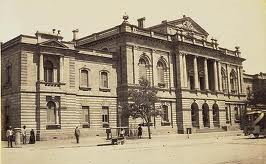 If you are researching South Austalian ancestors, here is some good news as it is all about easier access to records!
If you are researching South Austalian ancestors, here is some good news as it is all about easier access to records!
Until now accessing South Australian court records has not been an easy task, as you needed to go to the Supreme Court itself in Victoria Square, Adelaide.
Now thanks to the efforts of the Friends of South Australia’s Archives Inc., who have managed to get legislature changed, access to many records held by the South Australian Supreme Court is now easier than it ever has been, as they have been transferred to State Records SA.
Dated mostly in the 1800ss and covering a whole range of records, South Australia’s court records include the following: Indictments, Miscellaneous writs, Return of prisoners tried, Declarations, Acknowledgments of deeds, Memorials of benefits and building societies, Early insolvency matters, Miscellaneous business records, Roll of practitioners admitted in the Supreme Court of South Australia, Exchequer side, Information for forfeiture of mineral, Claimants Relief Act petitions 1854–1863, Intercolonial judgements and decrees, Matrimonial petitions, Company petitions, Lunacy petitions and a whole lot more …
So while it would be fabulous to say they’re online and downloadable … NO, they’re not, we’ll just have to keep dreaming on that one! But we do still have to thank Graham Jaunay and the Friends of South Australia’s Archives for even making the current (new) level of access to these records possible.
The following announcement was written by Graham Jaunay …
At the 2006 AGM of The Friends of South Australia’s Archives Inc, member and widely known genealogist, Andrew Peake, raised the issue of the closure of SA Supreme Court records and in particular nineteenth century divorce records as a consequence of new rules. They had previously been available through State Records of SA. At the following committee meeting of The Friends, Graham Jaunay pointed out that the closure of such records was of major concern to many researchers, academics and students and as a consequence the group decided to address the matter especially with regard to the records generated in the nineteenth century which were then well over one hundred years-old. Although The Friends committee met approximately four times a year, no one at that stage realised that this process would not reach a resolution until June 2013.
A series of meetings and correspondence between The Chief Justice in concert with the Registrar of the Supreme Court and The Friends representatives ensued over the next years. Graham Jaunay also wrote an article on the topic that was published in The Friends of South Australia’s Archives in their March 2008 newsletter.
In August 2011 the Court revealed that the matter was beyond their ability to address and outlined the state of affairs when the Registrar wrote to The Friends on 15 August:
‘The Chief Justice and I are of the view that it is not possible to improve access any further without legislative change to section 131 of the Supreme Court Act. We are in favour of a change allowing unrestricted access to records 100 years old, subject to any express order of the Court to the contrary.’It was then realised that the records had not been withdrawn as a consequence of new rules, but in fact because the Court had become aware that releasing information was contrary to existing rules!
The Friends committee wrote to the Attorney-General requesting improved access to these records in January 2012 and following discussions with the Chief Justice the Cabinet decided that an amendment would be made to the Supreme Court Act 1935 to enable free access to court records that were over one hundred years old and the Attorney-General advised The Friends committee accordingly on 14 June 2012.
At the time the Attorney-General was uncertain when the amendment would be made but indicated he intended to include it in the next omnibus Bill generated by his office. This came to pass in 2013 and was passed into law and became effective on 9 June 2013.
This is very good news because the courts are the third arm of Government dedicated to the administration of justice according to law. As such they constitute an essential part of our democratic framework.
The work of all arms of government should as a matter of principle be conducted openly and in public so far as possible. While I have no issue with this aspect as far as the courts in Australia function, the ability to access archived information is not so open. In my view this information should generally be accessible unless there is good reason for withholding particular information.
It is necessary to point out that the change to the Act only opens up records over 100 years old. It is still possible to access recent records, but the researcher will need to adopt the process in vogue for the past decade or so for all records held in the court. Oned also has to be aware that the access request may be refused.
To access these modern records the researcher needs to approach the Supreme Court Registry in the basement of the Sir Samuel Way Building at 241- 259 Victoria Square. (Note this location differs from the Probate Registry.) If unsure what records are available then a consultation of the series lists (GRG 36) held at State Records of SA may be required as the first step. Therefore the trip to the Court may require a stop over at the State Records of SA Reading room at 26 Leigh Street or accessing the material online. Note that State Records operates on restricted hours: Tuesday to Friday 9:30 to 3:30pm.
The Supreme Court Registry (Monday to Friday 9:30 to 4:30pm) will determine if the request for records is appropriate. It will then order the records from State Records and vet them before allowing the researcher access for a fee (currently $21 per file to vet plus $7 per page copy fee). If the researcher is denied access they can seek access by an application to the court.
Having read the above please do not rush to a State Records of SA Reading Room just yet! The legislation is in place but the Court (who still owns the records) has to formally inform State Records. State Records expects that the access procedure, when in place, will be the same as for all other records in its custody but that has yet to be confirmed. Even then it is possible that some individual records may be deemed sensitive and closed.
Supreme Court Records affected:
GRG36/1 Indictments (and some depositions)–Supreme Court 1837–1924
GRG36/2 Miscellaneous writs and returns habeas certiorari mandamus etc 1837–1891
GRG36/3 Affidavits 1837–1892
GRG36/4 Cognovits and warrants of attorney 1838–1860
GRG36/5 Records and judgements in common law 1838–1880
GRG36/6 Petitions, executors and administrators accounts 1838–1897
GRG36/7 Return of prisoners tried–Criminal sittings 1839–1839
GRG36/8 Depositions 1839–1853
GRG36/9 Bills of cost 1840–1893
GRG36/10 Criminal records 1841–1843
GRG36/11 Declarations 1840–1858
GRG36/12 Certificates of acknowledgment of deeds by married women to bar dower 1844–1844
GRG36/14 Acknowledgments of deeds etc 1845–1845
GRG36/15 Oaths of office police magistrates registrar general and deputy registrar general of deeds etc No Date–No Date
GRG36/16 Bail pieces 1847–1862
GRG36/17 Memorials of benefits and building societies 1850–1906
GRG36/18 Specimen schedules of fines imposed 1852–1867
GRG36/19 Specimen of criminal depositions 1854–1863
GRG36/20 Special cases and insolvency matters 1851–1892
GRG36/21 Early insolvency matters 1844–1850
GRG36/22 Petitions executors and administrators accounts Ecclesiastical jurisdiction 1855–1864
GRG36/23 Records relating to divorce 1859–1893
GRG36/24 Appeals against Local Court decisions 1862–1889
GRG36/25 Commissions for holding circuit courts 1863–1887
GRG36/26 Criminal files selected 1863–1899
GRG36/27 Returned writs of certiorari 1864–1888
GRG36/28 Schedules of recognizances estreated and fines imposed by the Supreme Court 1865–1891
GRG36/29 Removal of judgements from Local Courts 1886–1891
GRG36/30 Criminal trials–signed depositions1837–1837
GRG36/31 Miscellaneous papers–Supreme Court 1839–1909
GRG36/32 Miscellaneous case papers–Supreme Court 1840–1973
GRG36/33 Miscellaneous business records 1838–1893
GRG36/34 Roll of practitioners admitted in the Supreme Court of South Australia 1838–1924
GRG36/35 Court files–Equity Jurisdiction 1841–1879
GRG36/36 Commissions for evidence 1852–1879
GRG36/37 Court of appeals: petitions of appeal 1844–1882
GRG36/38 Exchequer side: files 1841–1848
GRG36/39 Revenue jurisdiction files 1863–1883
GRG36/40 Petitions–Ecclesiastical Jurisdiction, later Testamentary Causes Jurisdiction 1851–1872
GRG36/41 Information for forfeiture of mineral lease 1872–1873
GRG36/42 Claimants Relief Act petitions 1854–1863
GRG36/43 Privy Council appeals judgements 1866–1886
GRG36/44 Intercolonial judgements and decrees 1881–1886
GRG36/45 Memorials of judgements in other states 1887–1892
GRG36/46 Originating summonses–Equity Jurisdiction 1863–1892GRG36/47 Notary Public: applications 1860–1892
GRG36/48 Title of action in rem files, single number series–Vice Admiralty Court 1844–1891
GRG36/49 Articles of clerkship 1830–1892
GRG36/50 Petitions–Equity Jurisdiction 1838–1892
GRG36/51 Matrimonial petitions, numerical series–Matrimonial Causes Jurisdiction 1859–1893
GRG36/52 Company petitions 1855–1892
GRG36/53 Lunacy petitions 1853–1892
GRG36/54 Writs, claims, petitions etc, annual single number series–Supreme Court 1879–1969
GRG36/56 Papers relating J.B. and S. Hack v. Captain John Hart and Henry Jones 1837–1838
GRG36/57 Miscellaneous letters mainly to and from the judge and the Clerk of the Supreme Court1838–1852
GRG36/58 Miscellaneous records–Supreme Court 1838–1893
GRG36/60 Newspaper cuttings, memoranda and printed papers relating to the Judge Boothby case, complied by Hon. George Fife Angas MLC 1860–1862
GRG36/61 Confidential papers relating to the amoval of Judge Boothby 1866–1867
GRG36/62 Indentures signed by Governor Grey assigning convicts to the Lieutenant Governor of Van Dieman’s Land With certificate by clerk of Supreme Court July 1842 and November 1842
Local Court Records also affected (records less 100 yrs may remain closed):
GRG 3/1 Adelaide Local Court Minute books previously Resident Magistrate`s Court 1849–1882
GRG65/1 Minutes – Adelaide Police Court 1847–1936
GRG65/3 Maintenance orders – Adelaide Police Court 1880–1936
GRG65/6 Miscellaneous information, summons and warrants 1881–1900
GRG65/7 Court files – Adelaide Police Court 1904–1944
GRG 4 Various Local Courts (some of these records less than 100 yrs old are already open










I would appreciate information as to how I might obtain details of a court case dated Friday, 6th August 1926 in the Magistrates Court – Unley.
The case was in the name of Phillip Alfred Lampe (my father, now deceased).
Thankyou
How can I obtain a copy of a Matrimonial Petition (Divorce) for my father Benjamin john Merritt one in 1922 & another in 1926.
I would be firstly putting in a request with the Supreme Court (as detailed above), but you could also check with State Records SA, but I don’t believe they’ll have anything that recent, still worth checking though.
Hi, I am wondering if you can assist with obtaining all records presented to the court for this divorse. My partner is the granddaughter of Annie Elizabeth Loader (nee Bradshaw) and would like to get information for family reasons and tree.
Details are:
Supreme Court – In Banco
Adelaide: Tuesday, May 4th 1926
(Before Mr. Acting Justice Richards)
Decri Nisi for a dissolution of marriage were granted in the following case: Annie Elizabeth Loader against Nathaniel Loader, on the grounds of his misconduct with Harriet Elizabeth Oakley at Walkerville on various dates. Mr & Mrs Loader were married on February 26, 1909 at Boulder, Western Australia. There were no children of the marriage.